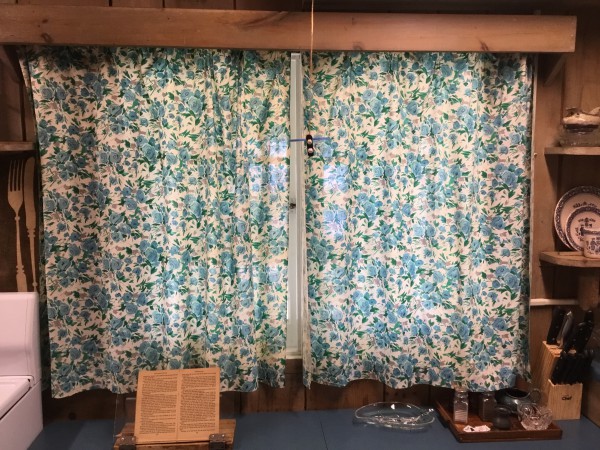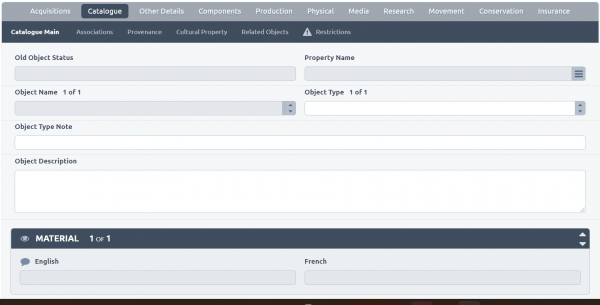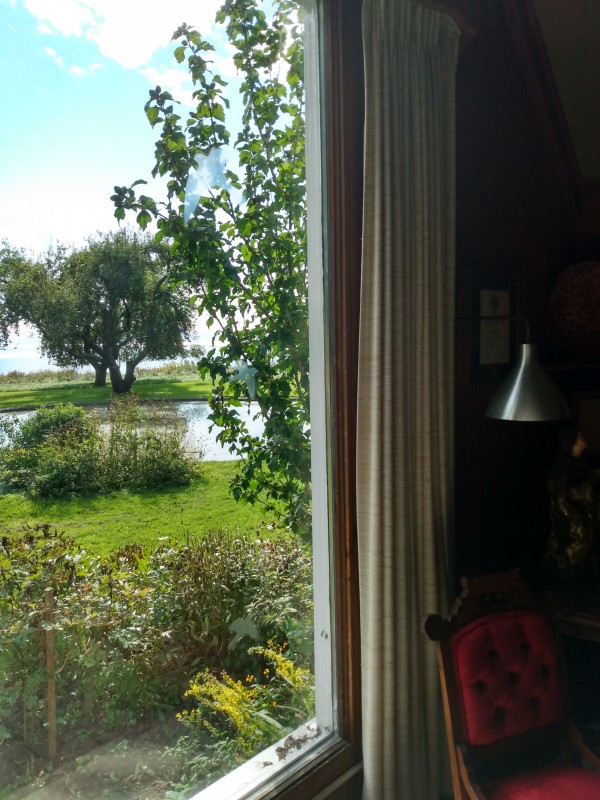Courses (2025-26)
Material Culture courses for the 2025-26 academic year. Please note: course listings change from year to year. Should you have any questions, please contact vic.academics@utoronto.ca.
MCS223H1S | Signs, Meanings, and Culture
MCS223H1S
Signs, Meanings, and Culture
Professor Ivan Kalmar
W 11-1
This course will introduce the principles of semiotic thought, applying them to the study of language, social organization, myth, and material culture. Examples may be drawn from everyday life as well as from classical and popular art and music, and from screen culture.
Exclusion: VIC223Y1
Distribution Requirements: Social Science
Breadth Requirements: Thought, Belief and Behaviour (2)
MCS224H1F | Approaches to Material Culture
MCS224H1F
Approaches to Material Culture
Professor Joanna Papayiannis
T 10-1
This course is about things – both the extraordinary products of human creativity and the everyday objects of human necessity. Using an interdisciplinary approach informed by archaeology, museum studies, anthropology, art history, economics and religion, students will investigate the material dimension of human life. The course will explore the relationship between material forms and people by considering a range of objects, such as artifacts and works of art, amulets and idols, and commodities and retail goods. Students will consider the activities that have helped form material culture, such as collecting, colonialism, globalization, and consumption, to explore issues of gender, race, and religion. Through creative assignments, hands-on activities and field trips to museums and galleries, students will discover that just as we create objects out of clay, cloth, copper, and canvas, the objects similarly construct us, socially and culturally, as human beings.
Exclusion: VIC224H1, VIC224Y1, MCS224Y1
Distribution Requirements: Social Science
Breadth Requirements: Thought, Belief and Behaviour (2)
MCS225Y1Y | A History of the World in Objects and Signs
MCS225Y1Y
A History of the World in Objects and Signs
Prof. Michael Chazan, Prof. Rebecca Woods, Prof. Nkem Ike
M 12-2
Through a multidisciplinary approach, this course opens new perspectives on the history of artifacts, the evolution of a world of things and signs, and the meanings of material culture. Lectures and tutorials are supplemented by hands-on exercises in museums and local communities.
Exclusion: VIC225Y1
Distribution Requirements: Humanities
Breadth Requirements: Creative and Cultural Representations (1), Society and its Institutions (3)
MCS226H1S| The Materiality of Magic
MCS226H1S
The Materiality of Magic
Professor Joanna Papayiannis
T 1-3
Magic is a wide field of study comprising spirituality, mysticism, paranormal events, the occult, and other unexplained phenomena. Scholarly research into magic has focused on the analysis of written texts, though material objects have played an indispensable role in the articulation and activation of magic. This course aims to (re-)materialize magic and to anchor it in the physical objects that have been employed for the practice and performance of ceremonies and rituals from Prehistory to the present day. Students will apply a number of theoretical and material lenses to understand how objects – relics, icons, effigies, charms, amulets – are transformed through, and become instruments of, rituals that control, placate, or please the supernatural world. In this course, students will engage hands-on with historical artifacts, books, and manuscripts in museum and library collections and participate in experiential classroom activities and physical demonstrations. Students will have the opportunity to make replica ritual objects, create spirit photographs, and develop a divination game.
Recommended Preparation: MCS224H1/ MCS225Y1
Breadth Requirements: Thought, Belief and Behaviour (2)
MCS325H1F | Media Semiotics
MCS325H1F
Media Semiotics
Professor Paolo Granata
M 1-3
Have you ever wanted to take your semiotics knowledge beyond the classroom and actually apply it to real world? In this course we will dig into the building blocks of media—signs, symbols, codes, narratives—and discover how they shape everything from TikTok trends to Instagram aesthetics to the subtle semiotics of Generative AI. Digital media, in fact, have become laboratories for meaning-making, where new forms of visual and textual language emerge daily, from advertising to social platforms. But now machines are learning to read and create signs too. Generative AI systems are becoming fluent in visual and textual languages, sometimes in ways that surprise even their creators. In this course, we will learn to decodify these signs. Through hands-on analysis of digital platforms, advertisements, films, viral posts, and yes, a lot of AI-generated content, you will develop the critical tools to decode how meaning works in digital culture and understand what happens even when AI tries to be “creative."
Prerequisite: MCS223H1/VIC223Y1
Breadth Requirements: Creative and Cultural Representations
MCS329H1F | Internship in Material Culture
MCS329H1F
Internship in Material Culture
Professor Cathie Sutton
A practical or experiential learning opportunity under the supervision of a faculty member, normally at a museum, art gallery or other cultural agency (as approved by the supervisor). This course is restricted to students enrolled in the Material Culture and Semiotics program. Not eligible for CR/NCR option.
This course is available in the following formats, based on the nature of the internship:
MCS329H1F - 0.5 credit, taken in the Fall semester
MCS329H1S - 0.5 credit, taken in the Spring semester
MCS329Y1Y - 1 credit, taken over Fall and Spring in an academic year
Prerequisite: Completion of 9.0 credits
Exclusion: VIC329H1/VIC329Y1
Distribution Requirement: Humanities, Social Science
MCS329H1S | Internship in Material Culture
MCS329H1S
Internship in Material Culture
Professor Cathie Sutton
A practical or experiential learning opportunity under the supervision of a faculty member, normally at a museum, art gallery or other cultural agency (as approved by the supervisor). This course is restricted to students enrolled in the Material Culture and Semiotics program. Not eligible for CR/NCR option.
This course is available in the following formats, based on the nature of the internship:
MCS329H1F - 0.5 credit, taken in the Fall semester
MCS329H1S - 0.5 credit, taken in the Spring semester
MCS329Y1Y - 1 credit, taken over Fall and Spring in an academic year
Prerequisite: Completion of 9.0 credits
Exclusion: VIC329H1/VIC329Y1
Distribution Requirement: Humanities, Social Science
MCS329Y1Y | Internship in Material Culture
MCS329Y1Y
Internship in Material Culture
Professor Cathie Sutton
A practical or experiential learning opportunity under the supervision of a faculty member, normally at a museum, art gallery or other cultural agency (as approved by the supervisor). This course is restricted to students enrolled in the Material Culture and Semiotics program. Not eligible for CR/NCR option.
This course is available in the following formats, based on the nature of the internship:
MCS329H1F - 0.5 credit, taken in the Fall semester
MCS329H1S - 0.5 credit, taken in the Spring semester
MCS329Y1Y - 1 credit, taken over Fall and Spring in an academic year
Prerequisite: Completion of 9.0 credits
Exclusion: VIC329H1/VIC329Y1
Distribution Requirement: Humanities, Social Science
MCS330H1F | Topics in Material Culture: The Materiality of Black Futures
MCS330H1F
Topics in Material Culture: The Materiality of Black Futures
Professor Nkem Ike
W 2-4
Writers, scholars, and scientists have long contemplated the question, is there a future without Black people? The Middle Passage, when more than 12 million people were trafficked from Western Africa to the Americas, was a phenomenon that served as an inflection point in human history where the exploitation of forced Black labor cemented a global hegemonic structure. The dehumanization of institutionalized chattel slavery and the status of “slave” branded Blackness equal to (human) commodities and placed Black people in a nebulous sub-human category. As race science took hold in such disciplines as anthropology and biology in the late 19th to mid-20th centuries, biological markers, predisposition to diseases, and poverty led Western scientists to determine that Black people would go extinct within generations. This idea prevails today as the concept of Black extinction is used to justify ongoing and compounding anti-Black violence through a racial calculus structured by the utter disregard for Black life and lifeways. As the “afterlives of slavery” take hold through oppressive forces such as environmental racism, coloniality, and capitalist exploitation, all of which continue to impact Black people globally, the question remains: how can Black people exist in the future when they were not meant to survive the past? Through an analysis that centers on the materiality of Black culture production, through deep analysis of African ontological frameworks, this course explores how objects associated with empowerment, liberation, and aliveness construct the realities of Black futures.
Breadth Requirements: Thought, Belief and Behaviour
MCS331H1S | Materiality of Information
MCS331H1S
Materiality of Information
Professor Cory Lewis
R 11-1
This course looks at the material culture of information from a global historical perspective. It explores the roots of our modern understanding of information through a series of case studies and practical activities like learning to write cuneiform characters on clay tablets, and cutting quill pens. These practical activities are framed by discussions of the material and cultural factors that influenced the development of information technologies throughout history.
Prerequisite: Completion of 9.0 credits
Distribution Requirements: Social Science
Breadth Requirements: Thought, Belief and Behaviour (2)
MCS336H1S | The Material Culture of Wine
MCS336H1S
The Material Culture of Wine
Professor Daniel Bender
T 1-4
Prerequisite: Completion of 4.0 credits
Breadth Requirement: Thought, Belief and Behaviour
MCS373H1F | Materialities of Music
MCS373H1F
Materialities of Music
Professor Ellen Lockhart
M 11-1
Prerequisite: Completion of 9.0 credits
Breadth Requirement: Creative and Cultural Representations
MCS444H1S | Themes in Material Culture
MCS444H1S
Themes in Material Culture
Professor Cathie Sutton
T 10-1
During this fourth-year seminar students pursuing a minor in material culture will have opportunities to explore themes in material culture studies, museum exhibitions and collections as well as processes of object analysis in greater depth and at an advanced level. Specific topics and research projects will vary according to the interests and specialties of course instructors and students.
This year in MCS444S we will examine the underground and underworlds through the lens of material culture and semiotics using a comparative approach, in both historical and contemporary contexts. The course will explore the making of the modern state through early mining, geological and archaeological practices, the development of the urban underground, and the artistic practices that have influenced vertical thinking. Visits to libraries, archives, and museum and galleries will focus on artifacts and primary sources that support our study of the material practices of underground knowledge making.
Each week a student will lead our class discussion as part of our study of the pedagogy of material culture and semiotics. Students will also learn skills required to write a conference proposal abstract, a conference paper, and a conference poster. Individual research will be presented in class and finals posters will be displayed at VIC Research Day.
Prerequisite: Completion of 9.0 credits including MCS224Y1/ MCS225Y1, or permission of instructor
Exclusion: VIC444H1
Breadth Requirement: Creative and Cultural Representations (1)
Material Culture Internships
If you're interested in completing an internship through the MCS329 - Internship in Material Culture course as part of your Minor in Material Culture and Semiotics, please contact vic.academics@utoronto.ca
These internships are practical or experiential learning opportunities completed under the supervision of a faculty member, normally at a museum, art gallery or other cultural agency.
Past Internship Projects
Completed MCS Internship Projects
Internship with the Ontario Heritage Trust MCS329Y1 2021-22

MCS intern Erin Case did research on conservation, repair, and replacement of curtains at heritage site

Digital Cataloguing Worksheet Used by the OHT
The next stage consisted of artefact handling and photographic documentation at the Elgin/Winter Garden https://www.heritagetrust.on.ca/en/properties/elgin-and-winter-garden-theatre-centre. Taking everything out of a display room, the intern was instructed on artefact handling and cleaning best practices, as well as how to take museum standard photographs. During the second half of the internship, the intern was trained in the OHT’s collections database protocol and data entry, and worked with their database, M3 Online. Over the course of several months, the intern inputted around half of the object worksheets from one site that had not previously been in the database. Throughout the internship, the intern worked both by herself and with her supervisor to complete tasks and develop practical skills that enhanced her learning in museum studies and material culture.

View from the window of Fools Paradise the former of home of Canadian artist Doris McCarthy
Dionysis Disclosed by Niki Wickramasinghe
Project website: https://dionysusdisclosed.wordpress.com
Psychical Research Project by Sophia Arts
Project website: https://sophiararts.wixsite.com/psychical-research
Sophia Arts did her internship at the Fisher Rare Book Library in 2020-21. The library asked Sophia to take over the Fisher Instagram account to share her research on a collection of Victorian books on ghosts and the supernatural. Please follow the link to see more about this unusual and fascinating research.
Names and Respect: The Archivist’s Role by Emily Grenon
Project: Names and Respect: The Archivist's Role [PDF]
Emily Grenon, a fourth year MC minor and History major, did her internship at the Pratt Library Archives transcribing the correspondence of the Indigenous missionary, Peter Jones. Emily turned her research into a poster that she presented at the Ontario Archives Association Conference at the conclusion of her internship.
Student Testimonials
“During my internship at the Royal Canadian Military Institute, I had the chance to gain a thorough understanding of various aspects of museum operations and logistics. I was able to apply some of my knowledge from Material Culture courses and expand on it by getting feedback and learning from a professional in the field. I assisted the museum with updating their online catalogue and documenting their collection. This included learning about museum software and the process of photographing artifacts. Additionally, I had the opportunity to learn about, and assist with, the planning and installation of a new exhibition. From this, I became familiar with the process of developing an interpretive plan, and the importance of small details such as object placements, word choice, etc. I decided to apply this to my final research project and discuss the museum’s own interpretive plan by analyzing the presentation of two important objects. This internship opportunity allowed me to experience working in a museum environment, and gain the knowledge and preparation needed to be successful in the museum and heritage sectors.”

Right: Photographying helmet for museum online catalogue
Left: MCS student assisted with installation of WW1 exhibit
"My internship project was focused on exploring and researching the settlement and material cultures of Black settlers, mainly those associated with the Dawn Settlement, in Southwestern Ontario (Dresden/Chatham-Kent) in the mid to late nineteenth century. I was supervised by Dena Doroszenko, a Senior Archaeologist at the Ontario Heritage Trust (OHT), Katherine Patton, an associate professor of anthropology at UofT, and Lisa Small, a graduate student and activist archaeologist, I worked on three different projects to do this. First, I wrote object biographies for objects under the care of the OHT, and then I conducted interviews with community members to add to the previous research I had done, as well as contribute to an oral history project. I also utilized the interviews to compile a list of sites of archaeological potential in the area. This internship project was a wonderful experience in strengthening my research skills in the humanities and social sciences and applying the theory I learned in my courses, as well as in learning about Black Canadian history in Ontario. The help and encouragement I received from my supervisors and course coordinator was key in helping me to complete and enjoy my project even with the challenges that come with doing this research remotely."
"Thanks to my minor in Material Culture, I was able to get my first professional experience interning at Casa Loma in the winter semester of 2021. Throughout the internship, I worked closely with one of the castle’s curators to research the history and material culture of four different rooms within the castle. Our research focused closely on the material culture of business, the upper-class, and the Edwardian era. Following this research, we were able to plan and develop a new audio guide system for the castle. I was also able to write an audio guide for each of the rooms I had researched! I am now continuing my work at Casa Loma throughout the summer, and I am thankful to have gained so many connections, analytical, and professional skills from the experience."
